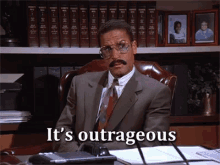Casting Out Outrage
The Curious Case of Aslan, Snape, and the Easily Offended
I don’t usually comment on current events. I’m grateful for the saints who do — those with the stamina to track every trending topic and the clarity to say something wise about it. God bless them. I mean that.
But I’m not one of them. I care — just not enough to comment. Most of the time, I shake my head with a faint air of superiority, whisper the Publican’s prayer of thanksgiving that “I’m not like other people,” and retreat to my tower of detachment.
Today, however, before I ascend, I want to ask a question:
What is wrong with us?!
A few weeks ago, the outrage machine (and I use that phrase intentionally, for it is a machine that we feed regularly with helpings of our souls) roared to life again. This time, the reason was the casting of Aslan. Yes, that Aslan. Meryl Streep is rumored to play him. And this news cranked the machine to level 99, filling the blogosphere and vlogosphere with all kinds of takes. Many of them radiated outrage at the thought that someone would do such a thing!
Now—full disclosure—I get it. As a purist, a theologian, and a loyalist to Lewis’ original vision, I understand the instinct to react like this. When a beloved story is altered, something sacred feels trespassed. It’s as if someone walked into an ancient cathedral during a prayer service, while having a discussion on speakerphone. I don’t even like it when people do this in the grocery store!
So, don’t think me too much of a prude; I understand the concern. But I do not understand when the concern leads to expressions of outrage, when they lead to people waxing prophetic about how this is a sign of the times—the zeitgeist! And calls for action to speak out and protest.
Another example is the upcoming “Harry Potter” TV series. (By the way, if you’ve never listened to Jim Dale’s audiobook versions, do so! The man is wizard-like in his ability to reflect different voices!) The casting list was recently released and, once again, folks lost their minds.
If you’ve read the books or watched the movies, look at the pictures below and guess which stoked the outrage.




Ten points for Gryffindor if you guessed Severus Snape!
In the books, Snape is described in such a way that you’d think he was raised in a moonlit cave, possibly by Gollum. The actor cast in the new series—well, let’s just say he wouldn’t sunburn quite as easily. The revelation set the easily flammable internet ablaze.
I repeat: What is wrong with us?
Of course, I could chalk all this up to the internet being the internet. But what troubles me more (and the reason for this post) is when that same spirit of outrage finds a home amongst the people of God.
When Christians start mirroring the world’s tantrums — especially over things as small as casting decisions — we should pause. We’re called to be different. Distinct. Holy. And not just in what we believe, but in how we behave when what we believe feels threatened.
Again, I understand the concern and the instinct. I even share it to a degree. When a story is good, don’t mess with it. I want to tell all directors: Use artistic freedom by all means—but when you visit someone’s house, don’t rearrange the furniture! And, for goodness’ sake, wipe your feet on the welcome mat before you track in your dirt!
But, if the creator does rearrange the furniture, if they do track in so much dirt as to make the place unrecognizable — and here I am speaking primarily to my sisters and brothers in Christ — save your outrage. Save it for moments that matter.
Outrage has become rooted in identity in the West; as such, it’s practiced liturgically. It is how modern people prove they take the appropriate things seriously and are virtuous. It’s a way of showing that they care and they belong. In other words, it’s not even about defending the story — it’s about defending ourselves. Outrage, these days, isn’t about the issue. It’s about me!
This leads to my pastoral concern for Christians. When we rage like the world, it’s a sign we’ve forgotten who we are. We “do not know what manner of spirit we are of” (Luke 9:55). Outrage is not a fruit of the Spirit. It is not something the Lord grows in us as we are being sanctified.
Disciples of Jesus must learn better ways to respond; ways that do not feed the machine, but reveal the reality of God. As usual, G.K. Chesterton offers a solution. He once said, “The test of a good religion is whether you can joke about it.” So, instead of outrage, perhaps a nice chuckle would suffice.
In the tradition of Jesus, our forbears were content with things like mocking and humiliation. I like to imagine they took the accusations of cannibalism in stride — maybe even loudly whispering, “Nice arms, bro. You been lifting?” while licking their lips.
Okay, maybe not the last part. But we understand what Chesterton was getting at.
Like Elijah’s chariots, good religion sweeps its practitioners into the Real Story, lifting us into something more substantial, more real. The effect of this is so deep that one might become wholly unbothered by clumsy attempts to rewrite it. It creates mature souls who can remain calm when someone misunderstands stories they love, stories that are meaningful to them.
Great peace have they which love thy law: and nothing shall offend them. — Psalm 119:165
In short, the gospel neither rises nor falls on the casting of Aslan. The Kingdom of God is not shaken by reinterpretations, not even a little bit. Instead, what we see in the story that Narnia points to is a message so strong that it creates an otherworldly response in the face of persecution.
Jesus was slandered, twisted, maligned, and misrepresented in every way—and yet “He opened not his mouth… he entrusted himself to him who judges justly” (1 Peter 2:22-23).
There is no record of the early church screaming in the comment sections of their day. They just kept gathering, praying, singing hymns, and receiving the body and blood of Christ. As Alan Kreider wrote, “Energized by the power of God that they experienced in worship, many of them lived interesting lives. And the rumors got out.”
We are not primarily called to defend meager stories. We are called to live in a grand one. The story we are caught up in has room for outrage, but not the constant trivial variety of this present darkness.
After all, the role we’ve been cast is to bear witness to the resurrection of Jesus Christ. Let the world rage. We have better things to do.





Thanks for this.
"Outrage is not a fruit of the Spirit. It is not something the Lord grows in us as we are being sanctified."
Acute observations. Over 50% of negative online communication is generated by 2% of the writers, the professional trolls who live to stir up controversy. And sadly they sometimes get results, as when a publisher withdraws a book because of online comments or when someone loses a job or acceptance to a college for a comment made in their teens on a social media site.